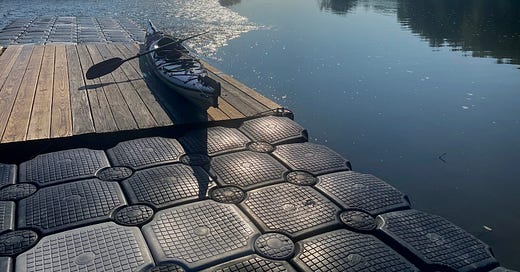Chernobyl overreaction, beyond burnout, and generic antibiotics! And the Lavender Lady returns!
RWL #406
Greetings from the LHH! It’s hard to believe we are less than three weeks until the first day of classes for the fall. Where does the time go? I haven’t spent much time on the water this summer - too many other things to do - but I was excited to get out on Monday morning with the Lavender Lady. The LL’s rudder had been broken for about two years - a small plastic piece that holds the rudder control together broke when I lost my balance and dropped her too hard after a paddle. I’d been trying to find a replacement, but it looked like I was going to have to buy a whole rudder replacement kit at about $350, which is was discouraging. So I took no action. Then I told my father about it, and he machined a replacement piece in his garage in no time and now I am back in business. My father is a mechanical genius - he can fix just about anything. I clearly got my mechanical skills from my mother. I’m just grateful to be back out on the water with LL. As with children, once can’t declare favorites with one’s kayaks. That would be wrong, plus TLW might use such statements to assert that I don’t actually need all of my kayaks, which I definitely do. The LL has a kevlar body, which makes it 17 feet of purple speed at about 35 pounds - feather light and fast, but comfortable.
I’m editing my next FITW podcast this week and plan to release it on the 18th. I also have a Health Leader Forge pod coming out next week. It’s been more challenging than I thought to produce one of each, each month. I’m continuing to work at it, but we’ll see. Is it a worthy use of my time? That might be the subject of an upcoming FITW newsletter. What is a worthy use of our time? That is the ultimate question we all have to answer.
Anyway, on to the links! As usual, willing good for all of you!
**
Read
What: Marginal Revolution, The Unseen Fallout: Chernobyl’s Deadly Air Pollution Legacy
Why: The 1986 Chernobyll nuclear power plant disaster caused a clear break in the building of new nuclear power plants globally. If you care about climate change, and especially if you think climate change is an existential threat, this should be deeply concerning to you. Nuclear power is a zero-emission source of power. It has its own challenges for waste management, but the waste is not air pollution (and hence pressure on climate) the way almost every other form of reliable energy is.
over the past 38 years, Chernobyl reduced the total number of NPPs [nuclear power plants] worldwide by 389, which is almost entirely driven by the slowdown of new construction in democracies. Our calculations thus suggest that, globally, more than 318 million expected life years have been lost in democratic countries due to the decline in NPP growth in these countries after Chernobyl.
Last Sunday’s FITW letter talked about risk. NPPs are branch risks. But 318 million life years, even if it is a high estimate, is worth taking such risks given the known costs of air pollution from other reliable sources of energy.
Most “renewables” are unreliable and have high cost to energy output ratios. Let’s hope that they eventually become cheap and reliable. But we should not compare the costs and benefits of fantasy sources of energy to actual sources of energy we have access to in reality. This error is known as the Nirvana Fallacy, and it seems to be largely directing the last 40 years of nuclear energy policy.
**
Watch
What: Beyond Burnout: Pathways to Healing for Individuals, Teams and Organization with Penni Perri (52 min)
Why: The American College of Healthcare Executives of Northern New England Chapter (ACHE of NNE) recently hosted a virtual session with therapist and coach Penni Perri on the subject of burnout. Perri focuses on provider burnout, but the session has general application. If you are an ACHE member, you can use this for an hour of self-reported qualified credit.
**
Listen
What: The Journal, The Quest to Save American-Made Antibiotics
Why: Antibiotics are one of the most important medical discoveries of the last 100 years. I would likely have been crippled or dead multiple times in my life if they hadn’t existed. Our domestic industry for producing generic forms of the oldest and most common forms of antibiotics is dying. The cost of domestic production is too high against the problematic system of reimbursement we have. Only one firm still makes generic amoxicillin in the US, and its owner is preparing to shut it down.




